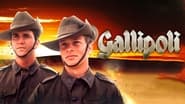classicsoncall
What most viewers get from the movie is the obvious notion of the futility of war and the infuriating mindset of military leaders to pursue a course of action that's doomed for failure. All true of course, but I came away with a different sense of what the picture may have been trying to convey with the characters and situations involved. For me it was all about the decisions, often made in a split second, that eventually determined the fate of men like Archy Hamilton (Mark Lee) and Frank Dunne (Mel Gibson). Consider Frank Dunne's decision to become friends with Archy shortly after losing the Kimberly Gift Race by a fraction of a second. That eventually led to Frank's joining the military when it was the farthest thing from his mind. And later on, Frank's bold stand that he and his new mates would forget about joining up if Snowy (David Argue) was disqualified for his bad teeth. All of these minor moments played a part in hurling the men headlong into disaster on the fateful day they were ordered to attack against the Turks at Gallipoli. However the ultimate irony occurred when Archy, in all his patriotic fervor, talked his Major Barton (Bill Hunter) into substituting Frank for himself as a runner between officers because they were both 'just as fast'. Not only is the agony reflected on Archy's face that he's about to be killed in a senseless military action, but also in the knowledge that Frank might have been in his place had he not persisted with his superior officer. And finally, I think we're meant to reflect on the outcome of that Kimberly Gift Race once again when Frank arrives with a message from the general that the assault was being reconsidered. That he was just a fraction of a second late, maybe that one-sixteenth of a second that Archy might have realized, and an entire third wave of men might have survived the massacre.The film's major controversy involves it's concentration primarily on Australian Army soldiers while ignoring the contributions of British, French and New Zealand military at Gallipoli. It's also easy to construe an anti-British bias due to the apparent sacrifice of young Aussies ordered to proceed headlong into death by incompetent English officers. In actuality, more British troops would die at Gallipoli than Australians, but the searing freeze frame image of Archy Hamilton running his last race is one that leaves a most indelible impression, and convinces how tenuous life can be in war time.
peefyn
This movie is not unique in its approach to war: instead of actual scenes of warfare, it rather uses it as a backdrop. Many movies does this. I guess I'm mentioning it here because it did so successfully. You are forced to reflect over the pointless sides of war, and what motivated those who enlisted.The movie is about the first world war, and it manages to display in and its members in a way that makes them seem like people of today. Other than their surroundings, they behave much like one would expect people do now, and the movie is all the much better for it. Often the stiff characters in war movies, especially those set during the first world war, distances you from the characters. In this, their liveliness has the opposite effect, and you actually relate to the relationships and emotions you see on screen.The music has not aged well, and you'd think they'd know that the sound of laser guns in the soundtrack would not stand the test of time. Oh well.
LeonLouisRicci
One of those Paradoxes. A Beautiful War Film. But of course the Movie is much more than a War Movie. It is about Male Bonding, Friendship, Sacrifice, Patriotism and most of All the Futility that was World War One. Along with such Great Films as All Quiet on the Western Front (1930) and Paths of Glory (1957) this is Another Example of what can Only be Described as the Fog of War Blinding the Commanders and Removing any Sense that is Common in Everyday Thought.The Film's Finale Portrays this Trench Warfare in a Gripping Third Act that Punctuates the Poetry Displayed in the First Two Thirds with its Excellent Cinematography and Lush Warm Colors. It is Deliberately Paced and Unfolds as Character Studies of Australian Youth Plucked from Their Prime and Placed in a Hell-Hole on the other side of the World.There may be a Misstep or Two like an Occasional Synthesizer Intruding on the Organic Beauty of the Film, or a Lopsided, Misplaced Nationalistic Conceit at the End (that the Director now acknowledges), but Overall this is Fine Filmmaking and is also Footnoted as an Early Career Starter for Director Weir and a Virtually Unknown Mel Gibson.The On Location Scenes in Egypt also Add a Layer on Top of this Already Well Textured Film that is a Fine Production All Around.
Kiwong1-567-978800
I watched an interesting documentary on the Gallipoli landing. Some of the myths of the landing were addressed: the ANZACS landed on the correct beach, the landing was done under the cover of darkness with few casualties. The British landing was horrible by comparison.I watched the movie Gallipoli, which I enjoyed and have given it a rating of 9.I see that the film been criticized for anti- British bias, depicting that slaughter of Australians being sent over the top against impossible odds, with the British command complicit in continuing the offensive.Despite the conclusions of the narrator of this documentary, that the loss of ANZACS was somehow only minor, and the British copped it worse, I can see how this myth may have developed. Apparently very early in the campaign Australian commanders recommended evacuation, the hills could be not be taken.However, the British commander Hamilton said no to this, and for troops to dig in. ANZAC troops were not evacuated for another 6 months at loss of 8,000 lives. So in that way many ANZACS, and British and French troops were lead to the slaughter and sacrificed unnecessarily in a campaign that was lost not long after the landing at Z beach and elsewhere on the Gallipoli peninsula, on a decision made by British commanders.







